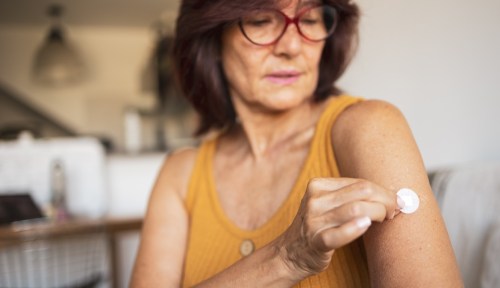Our editors independently select these products. Making a purchase through our links may earn Well+Good a commission
It’s inevitable that very person with female sex organs will face signs of disappearing fertility as they age: irregular menstrual cycles, hot flashes, vaginal dryness, and mood swings. These hormonal changes, which are caused by rising and falling levels of estrogen and progesterone, indicate perimenopause, which typically begins in a person’s late forties or early fifties, but can begin as early as their thirties. The ask for folks to accept their changing body and shifting identity in light of these factors can come with a slew of emotions, so it’s no wonder that sex drive during perimenopause can be significantly impacted.
In my research study for my book Sexually Woke, I studied over 1,000 women between the ages of 40 and 65, 715 of whom identified as perimenopausal or menopausal. The single most prevalent adverse symptom of their changing hormones was a decrease in sex drive (51 percent). Weight gain, fatigue, insomnia, and vaginal dryness rounded out the top five complaints.
While upon first thought, this may seem like an unpleasant stage in life, my research actually suggests otherwise. While the effects may compromise sex drive temporarily, I’ve found that people who go through perimenopause can not only reawaken their libido, but also have the best sex of their life, later on in life.
But in order for this to be the case, people must educate themselves on the realities of perimenopause and menopause and the related solutions and strategies that are available to try. I found in my research that six out of 10 women felt that they weren’t prepared for menopause, which is why education is so important. In that vein, I outline five insights below from my study and career as a gynecologist specializing in women’s midlife wellness for what to expect as you enter into perimenopause and menopause. Armed with knowledge, you’ll be better equipped to restore your libido and improve your sex life.
5 tips to embrace changes in sex drive during perimenopause, according to a gynecologist who focuses on midlife sexuality.
1. Change is inevitable, so embrace it
As we enter into perimenopause and menopause, and especially if we’ve had children, our bodies and sexual anatomy change, and we have to accept those changes in order to move forward. What used to feel good sexually might not anymore, and that’s okay. This is often the case with penetrative vaginal intercourse, especially in light of dryness and other physical changes, due to fluctuating hormones and aging.
So what does this mean for the future of your sex life? It means it might look different, but do know that different can mean better.
So what does this mean for the future of your sex life? It means it might look different, but do know that different can mean better. Consider reimagining how you define sex, and experiment with new sex toys, whether you’re in a partnered relationship or solo. Consider these changes as an exciting opportunity to get to know yourself and/or your partner again.
2. There is freedom in sex after menopause
Starting in our teen years, our libido is driven by hormones and the biologic reality of our fertility. During fertile years, pressure can come with penetrative vaginal sex to either get pregnant or prevent pregnancy, so with the transition out of that fertile window comes a sense of freedom from those underlying pressures. That freedom alone may give way to better sex.
3. Hormone replacement therapy could kick-start your libido
Bio-identical hormones (estradiol, progesterone, and testosterone) can be a safe and effective way to treat perimenopause and symptoms of menopause, and hormone replacement therapy (HRT) is a great option for reducing symptoms in many women that may boost their libido as well.
Hormones for menopausal relief may not be a fit for all patients, including many who have prior history of breast cancer or epilepsy. But for many, correctly administered hormone replacement can improve quality of life dramatically, as well as help with bone density and reducing colon cancer and Alzheimer’s risk. To make the best choices for you, consult your health practitioner.
4. Love yourself, and let go of resentment
One of my research findings about women in midlife with vibrant sex lives is that they are comfortable and familiar with their body. They know what they like and don’t like when it comes to sex. If you haven’t yet, perimenopause is an ideal time in your life to get to know your body—or even get to know it better.
I’ve found that resentment is the top libido crusher for those who identify as women, so forgiveness and restoring our relationships is key for a healthy, satisfying sex life later in life. Journaling and meditation can help with this process.
5. If you are in a partnered relationship, prioritize connection
Putting expectations or pressure around how frequently you and your partner should be having sex and the quality of your sex life can dampen your libido (and your partner’s as well). So instead of focusing on intercourse, prioritize connecting with and being intentional with your partner. Small, daily moments of presence, attention, and recognition can keep passion for one another alive and also shows that you care. Commit to giving your partner your full attention, because healthy communication stands to increase desire in your physical relationship.
Dr. Susan Hardwick-Smith, MD, is dedicated to empowering women in midlife to feel fully alive—sexually, relationally, and spiritually. An award-winning gynecologist and best-selling author of Sexually Woke, Dr. Susan believes that a woman can experience her most fulfilling life and truest self at 40, 50, and beyond.
Oh hi! You look like someone who loves free workouts, discounts for cult-fave wellness brands, and exclusive Well+Good content. Sign up for Well+, our online community of wellness insiders, and unlock your rewards instantly.
Sign Up for Our Daily Newsletter
Get all the latest in wellness, trends, food, fitness, beauty, and more delivered right to your inbox.
Got it, you've been added to our email list.










